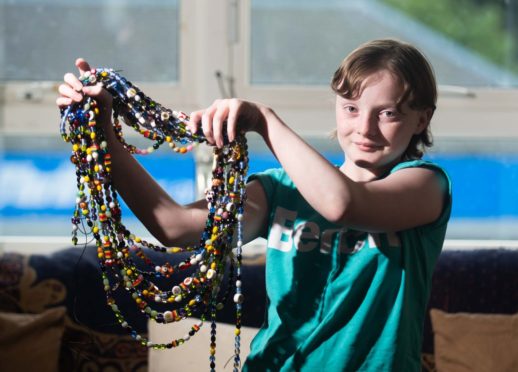When Kirsty MacDonald took her daughter to the doctor to get a swollen gland checked out, she thought the 12-year-old was coming down with a cold.
Just two days before, Amy had enjoyed a four-mile forest hike and been playing on her bike.
But that visit to the GP turned into a 10-week hospital stay, after doctors became concerned at the size of the lump and referred her to ENT at Aberdeen Royal Infirmary.
Once at hospital, tests revealed the youngster’s liver was failing but doctors had no idea why and put her into isolation.
For three weeks, hospital staff were baffled by her condition and when her other organs began to shut down they warned that if she did not respond to treatment she would dead within five days.
Consultants from around the country were called upon for advice, but when Amy’s kidneys, spleen, heart and lungs also began failing she was put in an induced coma and flown to the Edinburgh Sick Kids.
She was eventually diagnosed with a combination of two deadly diseases so rare that there were previously only three recorded cases in medical history, in which the patients – all men over 60 – died.
But after a gruelling year-long fight for life, Amy is now a picture of health and has astounded medics with her remarkable recovery.
And as she left hospital following her final procedure just three months ago, doctors said she was the “sickest child” to ever walk out alive.
Her mother said: “She’s my daily dose of inspiration.
“When they told me she had just five days to live, it just hit me like a brick.
“But she has shocked a lot of people and is now very well known in the medical profession.
“She just amazes me every day.”
Despite her ordeal, which resulted in her missing months of school, Amy was awarded a diploma of excellence for her positive behaviour, effort and attitude.
The brave youngster, who has just turned 13, also has a string of nearly 1,200 Beads of Courage as memento to show just how far she has come.
Each bead represents a life-saving procedure, which includes more than 40 hours of gruelling chemotherapy, five rounds of cancer drugs injected directly into her spine and 10 blood transfusions.
Amy was eventually diagnosed with secondary haemophagocystic lymphohistiocystosis (HLH) and peripheral t-cell lymphoma, a rare and deadly blood cancer – just weeks before her 12th birthday.
HLH – a disorder of the immune system – on its own affects just one in 1.2million people and is difficult to diagnose as it masks itself by feeding off other illnesses.
Even after the diagnosis, it was touch and go as to whether she would respond to treatment.
Miss MacDonald, 38, from Aberdeen, said: “Her professor said it was the first case in the UK he had come across with both conditions at the same time. That was unnerving because it meant they had not treated someone like that before.”
However, Amy has now bounced back and was told she was in remission earlier this year. She will receive regular check ups, and her stem cells have been harvested and frozen incase the diseases come back.
Miss MacDonald said: “It certainly makes you appreciate life a lot more, as I found that out in an hour last year that it could all be taken away for you.”
